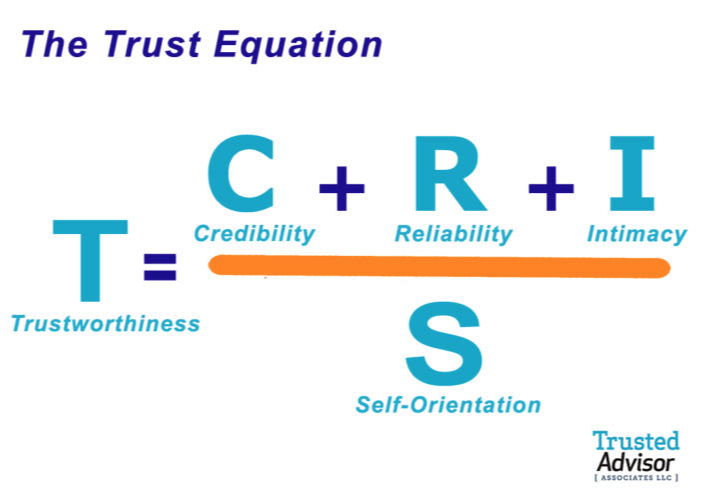
Whilst reflecting on my developing coaching practice, I started to think of the key principles that belong to all client/coach relationships. One of the most critical is trust.
A client/coach relationship only works if trust is at the heart of it. It is this principle that allows the client to open-up to the coach and feel safe in sharing their plans, fears, desires and challenges.
While trust is a two-way process, the focus is on the coach to create an environment in which the client feels able to talk freely. The coach must work on creating this trust from the first contact, through establishing the relationship, during and between coaching sessions and even in ending the coaching relationship.
Whilst thinking about trust in coaching relationships, I remembered a staff conference session I was involved some years ago, in which we looked at The Trusted Advisor, a book by David Maister, Charles Green and Robert Galford. The book looks at the core components of trust in a professional services relationship and explains these components through an equation:

The equation proposes that trust is dependant on an individual’s credibility: their proven credentials to do the job, their reliability: the fact that they deliver on their promises and intimacy: in the business sense that means people like to work with them. All these three when added together build trust, self-orientation is what destroys this trust, for example, if the client senses you are less interested in them than in yourself, they will trust you less.
I think this equation holds true in how trust can be developed in coaching relationships.
For a coach this can be built as follows:
Credibility comes from:
1) Having been trained by a recognised coaching training provider.
2) Being accredited by a recognised body.
3) A career history that shows a breadth and depth of experience.
4) The use of a well-structured coaching process, starting with clear contracting from the outset.
5) Chemistry sessions to allow the client to meet the coach and check they can work together.
6) Objective setting for the coaching sessions.
7) Explaining what coaching is and what it isn't (i.e. mentoring, therapy, coaching).
8) The confidential nature of coaching.
Reliability comes from:
1) Always being “present” for the client in a coaching session, demonstrating that the focus is on them and for their benefit.
2) From checking back against the agreed objectives to ensure that their needs are being addressed.
Intimacy comes from:
1) How the coach actively listens to the client, to help the client better understand the objectives they have set, what options they have to achieve them and how to select one and move forward.
2) The confidentiality that is in place.
3) The focus of the coach on the client in a non-judgemental manner.
Coaches need to manage their self-orientation to ensure that they maintain focus on the client and do not get distracted or direct the conversation in a direction that is of interest to them rather than the client. In coaching the issue being discussed belongs to the client, not the coach and the coach’s role is to help the client better understand the issue and what they can do about it.
In many ways, the trust that develops between a coach and their client is simpler than any other professional services relationships as the focus is purely on the client. It is this that makes a good coaching relationship a powerful vehicle for personal change.
If you would like to chat about coaching, please get in touch.
David Alcock
From the author:
As coaching is not an advice-giving service, these blogs are not written with the intention of proposing solutions to common leadership challenges. Instead, they are thought pieces with the aim of prompting the reader to think more deeply about the topic and reflect on whether it warrants further exploration, with or without a coach.
If you would like to hear more about coaching and how to make it work for you, feel free to subscribe to my newsletter and to share this blog with anyone that might be interested in learning about executive coaching, how it works and whether it could be of benefit to them.